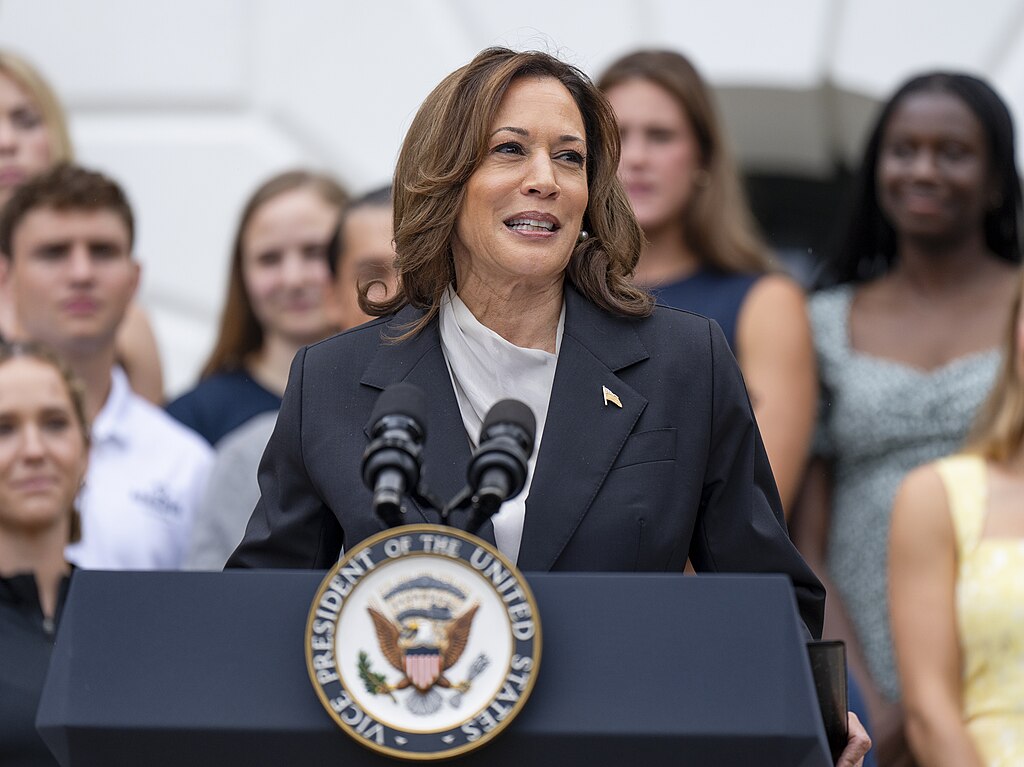There were many attacks from both sides during the U.S. presidential debate between Kamala Harris and Donald Trump. Yet while Trump could afford to criticize Harris by questioning both her intelligence and her loyalty to the United States, Harris couldn’t do the same.
Why not?
One reason is gendered expectations about women leaders, and about women in positions of power more generally. The 2024 election campaign offers distinct visions of the United States and its future. It is also an opportunity to study the political rhetoric and the way in which the two politicians justify their decision to run for president, and attempt to reach American voters.
This campaign is also the second in which a Democratic woman is running against a Republican man. Although Hillary Clinton faced off against Trump in the 2016 presidential election, the media are paying a great deal of attention to what remains a novelty: a female presidential candidate. What’s more, if she is elected, Harris will be not only the first female, but the first racialized woman to be president.
Since, in the U.S. at least, few women have been elected to such high office, and there are few role models to draw on, a certain confusion will likely follow: female politicians may wonder about the right campaign strategy to adopt, while the media may need to review or reassess the way they cover politics. Citizens, meanwhile, may find themselves disoriented and possibly lacking the criteria necessary to evaluate a female candidate.
As part of my research in political communication at the Université du Québec à Trois-Rivières, and as a co-researcher in the Chair on Leadership and Political Confidence, I am particularly interested in how women politicians are presented in the media, and in the challenges female leadership poses to the media. I’ve already shared my work on these topics in several articles about female leadership in La Conversation.
Double standard
Harris is the object of abundant commentary on her clothes and her private life. This is a double standard. These are questions that are only discussed when they are perceived as defects in women but as qualities in men. For example, men will be described as authoritative while women will be called bossy.
Indeed, studies have shown that negative coverage of the clothes worn by female politicians can have a negative effect on their chances of being elected. Other research has shown that women lose support when their appearance is discussed in the media. And yet other research shows that traits such as assertiveness, determination and ambition are considered masculine, not feminine.
In other words, whether we like it or not, women politicians have to wade through rough waters in a political world where the double bind is prevalent, and where gender stereotypes shape the expectations of media and the public. The fact remains that emphasizing gentleness and so-called feminine qualities can turn out to be a trap for women politicians. For instance, research shows that voters prefer so-called masculine qualities, especially in times of crisis.
Harris’s challenge is to present the image of a presidential candidate in a context where, following in Clinton’s footsteps, she is the first to attempt to break the glass ceiling, or find herself on the glass cliff. How does Harris manage to meet these challenges and navigate this specific context?
Her answer is to craft a positive narrative in which she presents herself as a competent, authentic leader who is close to citizens and understands their concerns.
Middle class: A leader close to the people
Harris presents herself as a candidate who is close to the people and understands their lives. This approach ties in with the proximity dimension of the leadership triangle as presented by Diego Ceccobelli and Luigi Di Gregorio, Italian political communication researchers with whom we collaborate. Their theory is that leaders are evaluated according to three criteria: competence, authenticity and proximity.
In line with the theory, Harris emphasizes that she comes from a middle-class background and is the daughter of a single mother who raised her and her sister in a working-class California neighbourhood. Her mother worked hard to put her through school and to be able to buy a house. Harris uses this narrative in her speeches, her political communications on social media, her debate appearances and her responses to journalistic interviews.
This positioning is also a valuable strategy that Harris uses to distinguish herself from Trump, who projects the image of a wealthy white man with little or no interest in the middle class. Trump’s campaign is a particularly masculine one. He makes the most of news clips designed to appeal to people’s fears, whether of others, of immigrants, of war, or for their economic and physical safety. For Trump, immigrants are the root of all the U.S.’s current problems: crime and lack of housing, health care and education. Trump maintains that women are weak and, therefore, that Harris can’t be a good president.
To avoid being framed this way, Harris emphasizes the fact that she is a strong woman who, as a prosecutor, has put many people behind bars and has not been afraid to stand up to them. Before pleading, she has always stated, “Kamala Harris for the people.” This was an important element of her speech at the Democratic Convention in August.
The first woman
Finally, while the media frequently uses “first woman candidate” framing in covering her campaign, Harris rarely brings this up or uses it as an argument to convince American citizens to vote for her and her party. Instead, she builds her legitimacy on a narrative that places her at the heart of middle-class America.
Her challenge remains to convince the American population that she is the right person to lead the United States, and by doing so, to break the glass ceiling for herself and the female politicians who follow her.



 Middle East Conflict Escalates After Khamenei’s Death as U.S., Israel and Iran Exchange Strikes
Middle East Conflict Escalates After Khamenei’s Death as U.S., Israel and Iran Exchange Strikes  The strikes on Iran show why quitting oil is more important than ever
The strikes on Iran show why quitting oil is more important than ever  HHS Adds New Members to Vaccine Advisory Panel Amid Legal and Market Uncertainty
HHS Adds New Members to Vaccine Advisory Panel Amid Legal and Market Uncertainty  Failure of US-Iran talks was all-too predictable – but Trump could still have stuck with diplomacy over strikes
Failure of US-Iran talks was all-too predictable – but Trump could still have stuck with diplomacy over strikes  Pentagon Leaders Monitor U.S. Iran Operation from Mar-a-Lago
Pentagon Leaders Monitor U.S. Iran Operation from Mar-a-Lago  Does international law still matter? The strike on the girls’ school in Iran shows why we need it
Does international law still matter? The strike on the girls’ school in Iran shows why we need it  U.S.-Israel Strike on Iran Escalates Middle East Conflict, Trump Claims Khamenei Killed
U.S.-Israel Strike on Iran Escalates Middle East Conflict, Trump Claims Khamenei Killed  Booked to travel through the Middle East? Here’s why you shouldn’t cancel your flight
Booked to travel through the Middle East? Here’s why you shouldn’t cancel your flight  BTC Blasts +$3,500 to $66,300 High — ETF Inflows Spark Institutional Comeback, Bulls Target $75K
BTC Blasts +$3,500 to $66,300 High — ETF Inflows Spark Institutional Comeback, Bulls Target $75K  Argentina Tax Reform 2026: President Javier Milei Pushes Lower Taxes and Structural Changes
Argentina Tax Reform 2026: President Javier Milei Pushes Lower Taxes and Structural Changes  The Pentagon strongarmed AI firms before Iran strikes – in dark news for the future of ‘ethical AI’
The Pentagon strongarmed AI firms before Iran strikes – in dark news for the future of ‘ethical AI’ 
































